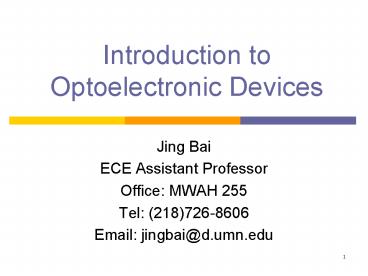Introduction to Optoelectronic Devices - PowerPoint PPT Presentation
1 / 25
Title:
Introduction to Optoelectronic Devices
Description:
... Conversion Between Electrons and Photons. Light-emitting diodes (LEDs) (display, lighting, ... Light-Emitting Diodes (LEDs) ... LED lights on an Audi S6. 11. Laser Diodes (LDs) ... – PowerPoint PPT presentation
Number of Views:833
Avg rating:3.0/5.0
Title: Introduction to Optoelectronic Devices
1
Introduction to Optoelectronic Devices
- Jing Bai
- ECE Assistant Professor
- Office MWAH 255
- Tel (218)726-8606
- Email jingbai_at_d.umn.edu
2
Outline
- What is the optoelectronics?
- Major optoelectronic devices
- Current trend on optoelectronic
- devices
- My current research work on
- nanoscale optoelectronic devices
3
What Did the Word Opto-Electronics Mean?
- Optoelectronics is the study and application of
electronic devices that interact with light
4
Examples of Optoelectronic Devices
5
Major Optoelectronic Devices- Direct Conversion
Between Electrons and Photons
- Light-emitting diodes (LEDs)
- (display, lighting,)
- Laser diodes (LDs)
- (data storage, telecommunication, )
- Photodiodes (PDs)
- (telecommunication, )
- Solar Cells
- (energy conversion)
6
Light-Emitting Diodes (LEDs)
Light-emitting diode (LED) is a semiconductor
diode that emits incoherent narrow-spectrum light
when electrically biased in the forward direction
of the p-n junction.
7
Photon Emission in Semiconductor
When an electron meets a hole, it falls into a
lower energy level, and releases energy in the
form of a photon. The wavelength of the light
depends on the band gap of the semiconductor
material
Semiconductor materials Si, Ge, GaAs, InGaAs,
AlGaAs, InP, SiGe, etc
8
Operation Principle of LED
9
Semiconductor Materials vs. LED Color
10
Application of LEDs
- Display
- Solid-state lighting
- Communication
- Remote control, etc
LED lights on an Audi S6
11
Laser Diodes (LDs)
Lasers (Light Amplification by Stimulated
Emission)
12
Laser Cavity Design
13
Photo Diodes (PDs)
A photodiode is a semiconductor diode that
functions as a photodetector. It is a p-n
junction or p-i-n structure. When a photon of
sufficient energy strikes the diode, it excites
an electron thereby creating a mobile electron
and a positively charged electron hole
14
Operation Principle of a PD
15
PDs Detection Range and Materials
16
Solar Energy Spectrum
Solar radiation outside the earths surface 1.35
kW/m2, 6500 times larger than worlds energy
demand
Spectrum of the solar energy
AM0 radiation above the earths
atmosphere AM1.5 radiation at the earths
surface Blackbody radiation ideal radiation
17
Vision of Solar Cells (Photovoltaics)
18
Operation Principle of Solar Cells
19
Residential and Commercial Applications
Challenges cost reduction via a) economy of
scales b) building integration and c)
high efficiency cells
20
Trends in optoelectronic devices
- Long wavelength, high power light sources or
- photodetectors
- Nanoscale devices
- Low cost, easy fabricated materials
- High opto-electronic conversion efficiency
- Multi-wavelength sources
Next, my current research topic nanoscale
optoelectronic devices
21
Quantum Cascade Lasers ? MIR Light Emission
The wavelength of quantum cascades laser lies in
the mid-Infrared (MIR) region (330 µm)
Many chemical gases have strong absorption in
mid-infrared region, such as CO,NH3,, NO, SO2,,
etc.
22
Quantum Cascade Lasers (QCLs) a New Light
Generation Mechanism
Cascading effect
- Advantages
- Wavelength depends on layer thickness (flexible
design) - Well-mastered materials can be used for long
wavelength - Multiple colors can be generated in same laser
- High output power due to cascading effect
23
Applications of QCL
24
Quantum Dot Superlattice Solar Cell
Au grid bar
25
Quantum Dot Superlattice Solar Cell
ECV
Band structure of quantum dot superlattices
Current-voltage relationship































